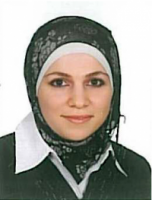Sharif, Ahlam | Jordania

Ahlam graduated from the University of Jordan in 2005 with a BSc. in Architectural Engineering. She was trained and then employed as an architect in a number of architectural design firms and real estate development companies in Jordan and Saudi Arabia. Her key areas of expertise include architectural and urban design and user perceptions and behaviors pertaining to technological and innovative design concepts. She obtained her MA in Architecture and Urbanism from Manchester School of Architecture in 2012. She is currently a Doctoral candidate at Manchester Architecture Research Centre (MARC), the University of Manchester, pursuing a PhD degree in Architecture. Her main research interests are in the area of sustainable architecture and its transferability over different places and times.
Parallel to pursuing her postgraduate degrees, she actively worked as a teaching assistant and enthusiastically participated in organizing several events and conferences in Manchester, UK that aimed at promoting knowledge sharing amongst researchers and addressing concurrent sustainability issues. In addition to that, she participated in multiple workshops, competitions, seminars, and conferences in the UK, the Netherlands, Austria, and Portugal, where a focus on sustainability was most evident. She has also spent a month in 2014 as a Fellow of the Institute for Advanced Studies on Science, Technology and Society in Graz, Austria.
Project at IAS-STS: The transferability of sustainable design concepts
The research aims at applying a closer look on the transferability of sustainable design concepts and the role of and the effect on technology in achieving such transfer between the developed and developing parts of the world, with the different contexts they present. The main case study emphasized by the research is Masdar eco-city that evolved through collaboration between the architectural and urban planning firm Foster and Partners in London (UK) as the lead designer and the government of Abu Dhabi (UAE) as the main developer. Focus is provided on the first two phases comprising part of Masdar Institute of Science and Technology, with particular interest in the residential units accommodating the students of the institute.
The question addressed by the research is on how sustainable design strategies are intended by the designer, potentially managed by the developer, and eventually experienced by the user while taking into account other involved actors. This assumes further importance where the designer from one hand and the developer and the user from the other happen to be from different contexts at a particular time. How could those ideas of sustainability accordingly be transferable between them while being modified, recreated, and re-appropriated in so many different ways and, at the same time, affecting their social and cultural surrounding? Put differently, how slow, elaborate, and contingent is such a transfer process when taking into account the variability of contexts at a particular time reflecting different needs, circumstances, knowledge, backgrounds, and expectations in relation to sustainability, which marks the particularity of this research.
In order to explore these aspects, the research entails elaborate fieldwork that includes formal and informal interviews with the designer, developer, and end user, along with other involved actors. This comes in addition to site observation inside and outside the residential units themselves, with the aim of grasping the full complexity of technology and its transfer.
Selected Publications
Sharif A., 2014. Rethinking Sustainable Architecture: Beyond the Technological Approach, in Khan A. (Ed.), Architecture and sustainability: Critical perspectives. Brussels: LUCA Press (forthcoming).
Sharif A., 2014. ‘Sustainable Design Concepts Across Borders: The Case of Masdar’. Paper presented at the 5th International Sustainability Transitions Conference, Utrecht, the Netherlands.
